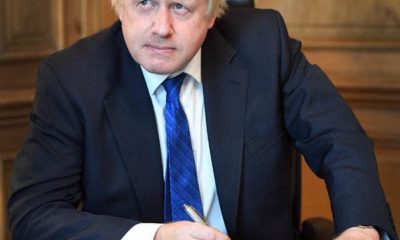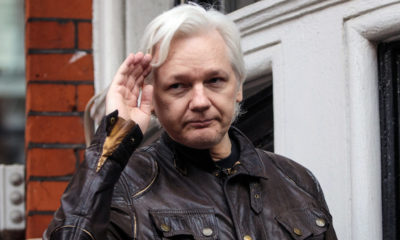Top News
Britain should double intake of Indian students
Student mobility is a proven means of building long-lasting relations between countries. There is no better opportunity for India and Britain to further this cause than now when our two countries mark the 400th year of direct relations.
As chancellor of the University of Birmingham, the most frequent question I am asked during my visits to India relates to Britain’s post-study work visa that allows students to work with a minimum salary threshold of 20,000 pounds a year. That’s a little under Rs.2 million.
In 2007 I led an initiative in the British parliament calling for a two-year post-graduate work visa for international students. I was certain this would prove to be an attractive proposition, especially for Indian students. It offered the opportunity to remain in Britain for two years after graduation and enabled international students work and earn some money to pay for their education.
This, indeed, worked very well. In the larger context, it continued to reinforce the bridges between our two countries. As an Indian student in Britain, there was also the prospect of building bridges for your country, enabling a third generation to be educated in the UK and paving the way for future generations in years to come. I myself was the third generation of my family to be educated in the United Kingdom, something that gave me a wonderful start in life.
However, many of the positive developments for international students have gone backwards – especially now that the two-year visa is no longer automatically granted upon graduating. The student has to get a job first, after satisfying the minimum salary threshold, and only then is one given a little time to find work. From my own experience, no Indian is going to stay on in Britain if he or she does not get work.
On the positive side, any graduate in the UK can expect to earn at least 20,000 pounds a year – which is below the average salary in the country. So in a way, when you actually get a job, the situation is even better than before. That is because you can now be entitled to a three-year visa, which is extendable by up to five-six years.
However, the absence of the term ‘Post Study Work Visa’ is off-putting to many Indian students, who do not realise technical terms such as ‘Tier Two’ – reverting to the old terminology would be a straightforward way to make the current arrangements more welcoming to Britain’s international students.
There is another issue, that of categorising students. Do we really want to call them immigrants? This is particularly important in the context of signals sent out by Britain with regard to immigration targets. The Government wants to reduce immigration by tens of thousands and bring down the net level to below 100,000. The figure now is more than 200,000 people.
The crux of the problem is that we continue to categorise international students as “immigrants”. They have to be taken out of this list to send out the signal that we don’t want to look at students as immigrants. In fact, we want to welcome them and increase the number of foreign students in Britain.
By all means, one must clamp down on illegal immigration and crack down on the bogus colleges. But Britain has more than 130 bona fide universities. We should actually be setting a target to increase the number of foreign students.
The Minister for Universities and Science, Greg Clark MP, with whose delegation I visited India earlier this month, has publicly said that the UK is going to increase the number of foreign students. It is the first time that I have heard anyone from the Government say this so publicly.
I would go further and say we want to double the number of Indian students by 2020. International students are one of Britain’s top 10 exports. This is no philanthropy. The economic benefit to the country is close to a $20 billion. This is not counting the cultural benefits to domestic students in Britain – by their interactions with their fellow learners from overseas, notably a nation as diverse as India.
Top News
Dr. Abhishek Verma Dedicates a Shelter in Memory of His Mother, Veena Verma, at KGMU; Inaugurated by Daughter Nicolle Verma

World-renowned business tycoon Dr. Abhishek Verma has supported Foodman Vishal Singh’s Hunger-Free World mission. In memory of his mother, Late Veena Verma, who was a 3 term Rajya Sabha MP.
Dr. Verma dedicated a state-of-the-art free permanent shelter for the attendants of patients at KGMU Medical University, Lucknow, under the aegis of Vijay Shree Foundation. His daughter, Nicolle Verma, inaugurated the shelter.

During the event, Foodman Vishal Singh honored Nicolle Verma by presenting her with a memento. Mrs. Nidhi Sharma and Avantika Yadav, associated with the organization, welcomed her with garlands. Following this, Nicolle Verma distributed essential items to the attendants and also handed out fruits. She became emotional remembering her grandmother on her birth anniversary.
On this occasion, she also inaugurated the “Veena Verma Sevalaya” in memory of her grandmother, Veena Verma, to serve the attendants. She expressed, “I feel proud that my family is engaged in nation-building as well as social service. Today, in collaboration with Vijay Shree Foundation founder Foodman Vishal Singh Ji, I feel immensely proud to dedicate this shelter for the poor, helpless, and needy attendants of patients battling serious illnesses like cancer. I am honored to be associated with the Hunger-Free World Mission for humanity.”

Inspired by the continuous humanitarian service provided by Vijay Shree Foundation over the past 17 years, Nicolle Verma donated 10 lakh rupees to support the cause. The purpose of this donation is to ensure that services continue for the needy attendants of patients suffering from severe illnesses in hospitals, as facilitated by Foodman Vishal Singh.
It is noteworthy that Dr. Abhishek Verma’s family has a legacy of public and philanthropic service. They are helping millions to carry forward the values and service work of their parents. On the occasion of his mother’s birth anniversary, Dr. Abhishek Verma dedicated this state-of-the-art permanent shelter at Lucknow Medical College to serve the attendants of patients through the Vijay Shree Foundation.

Supporting Foodman Vishal Singh’s Hunger-Free World mission, Dr. Abhishek Verma assured that he would continually support keeping this flame of humanity alive. He also promised to assist in providing medicines to the helpless patients.
Continuing her grandmother’s legacy of service, Nicolle Verma personally served food to the needy patients and attendants. She said, “It is our good fortune to have received the joy of doing this noble work today through Foodman Vishal Singh. I have taken another step forward in carrying my family’s values and cooperation by joining hands with the Vijay Shree Foundation. My father taught me to serve and help the needy, and I feel happy when I bring a smile to someone’s face.”

On the birth anniversary of the late Veena Verma, the event organizer, Vijay Shree Foundation founder Foodman Vishal Singh, said, “We feel proud and happy that Dr. Abhishek Verma, a globally renowned business tycoon, has extended his support to uplift our country from the hunger index. Today, on his mother’s birth anniversary, he inaugurated a state-of-the-art permanent shelter at Lucknow Medical College, which will always be helpful for the needy attendants of patients. It is a pleasure for me and the organization to receive the affection of Mr. Verma.”
The event was attended by General Manager Verma Family Office Hemant Garg, Sonu Rajput, and the organization’s volunteers, including Sandeep Singh, Parmeshwar Ji, Prashant Rao Gautam, Balram Singh, Ramesh Chaudhary, Suman, Jeetu, Anil, Suraj, Vinay, Manish Bhadauria, Manas Mehrotra, Vivek, Apurv, Happy, and others.























